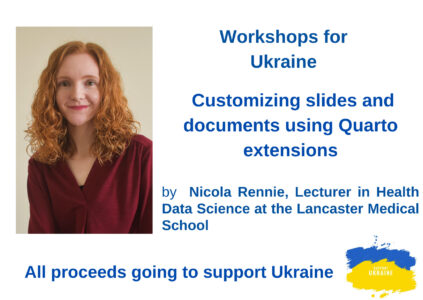Join our workshop on Factor Analysis in R, which is a part of our workshops for Ukraine series!
Here’s some more info:
Title: Factor Analysis in R
Date: Thursday, February 1st, 18:00 – 20:00 CET (Rome, Berlin, Paris timezone)
Speaker: Gagan Atreya is a quantitative social scientist and data science consultant based in Los Angeles, California. He has graduate degrees in Experimental Psychology and Quantitative Political Science from The College of William & Mary in Virginia and The University of Minnesota respectively. He has multiple years of experience in data analysis and visualization in the social sciences – both as a researcher and a consultant with faculty and researchers around the world. You can find him in Bluesky at @gaganatreya.bsky.social.
Description: This workshop will go through the basics of Exploratory and Confirmatory Factor Analysis in the R programming language. Factor Analysis is a valuable statistical technique widely used in Psychology, Economics, Political Science, and related disciplines that allows us to uncover the underlying structure of our data by reducing it to coherent factors. The workshop will heavily (but not exclusively) utilize the “psych” and “lavaan” packages in R. Although open to everyone, a beginner level familiarity with R and some background/interest in survey data analysis will be ideal to make the most out of this workshop.
Minimal registration fee: 20 euro (or 20 USD or 800 UAH)
How can I register?
- Go to https://bit.ly/3wvwMA6 or https://bit.ly/4aD5LMC or https://bit.ly/3PFxtNA and donate at least 20 euro. Feel free to donate more if you can, all proceeds go directly to support Ukraine.
- Save your donation receipt (after the donation is processed, there is an option to enter your email address on the website to which the donation receipt is sent)
- Fill in the registration form, attaching a screenshot of a donation receipt (please attach the screenshot of the donation receipt that was emailed to you rather than the page you see after donation).
If you are not personally interested in attending, you can also contribute by sponsoring a participation of a student, who will then be able to participate for free. If you choose to sponsor a student, all proceeds will also go directly to organisations working in Ukraine. You can either sponsor a particular student or you can leave it up to us so that we can allocate the sponsored place to students who have signed up for the waiting list.
How can I sponsor a student?
- Go to https://bit.ly/3wvwMA6 or https://bit.ly/4aD5LMC or https://bit.ly/3PFxtNA and donate at least 20 euro (or 17 GBP or 20 USD or 800 UAH). Feel free to donate more if you can, all proceeds go to support Ukraine!
- Save your donation receipt (after the donation is processed, there is an option to enter your email address on the website to which the donation receipt is sent)
- Fill in the sponsorship form, attaching the screenshot of the donation receipt (please attach the screenshot of the donation receipt that was emailed to you rather than the page you see after the donation). You can indicate whether you want to sponsor a particular student or we can allocate this spot ourselves to the students from the waiting list. You can also indicate whether you prefer us to prioritize students from developing countries when assigning place(s) that you sponsored.
If you are a university student and cannot afford the registration fee, you can also sign up for the waiting list here. (Note that you are not guaranteed to participate by signing up for the waiting list).
You can also find more information about this workshop series, a schedule of our future workshops as well as a list of our past workshops which you can get the recordings & materials here.
Looking forward to seeing you during the workshop!
